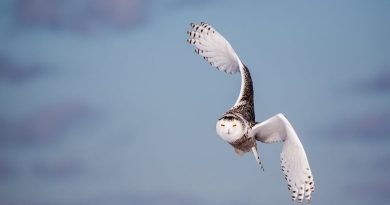Sea level rise to provoke ‘profound governance challenges’ & ‘difficult social choices’ says UN climate report
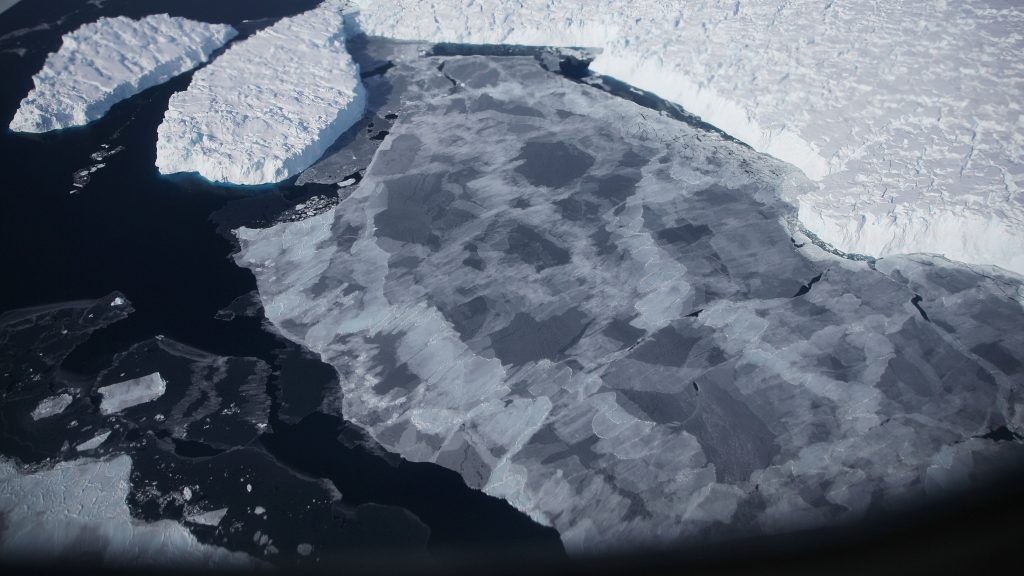
Climate change in the world’s polar regions is affecting every corner of the planet and urgent action is needed to slow the catastrophic changes to the world’s ice and oceans, said a UN report approved on Tuesday in Monaco.
“The open sea, the Arctic, the Antarctic and the high mountains may seem far away to many people,” said Hoesung Lee, chair of the Intergovernmental Panel on Climate Change (IPCC), in a news release on Wednesday.
“But we depend on them and are influenced by them directly and indirectly in many ways – for weather and climate, for food and water, for energy, trade, transport, recreation and tourism, for health and wellbeing, for culture and identity.”
“If we reduce emissions sharply, consequences for people and their livelihoods will still be challenging, but potentially more manageable for those who are most vulnerable.”
The Special Report on the Ocean and Cryosphere in a Changing Climate (SROCC) was prepared by 104 authors and review editors from 36 countries, including Canada, and paints a dire picture of how climate change at the poles is transforming the globe’s seas and ice.
A graphic from the Special Report on the Ocean and Cryosphere in a Changing Climate illustrating some of climate change’s projected impacts on Arctic life and the environment:
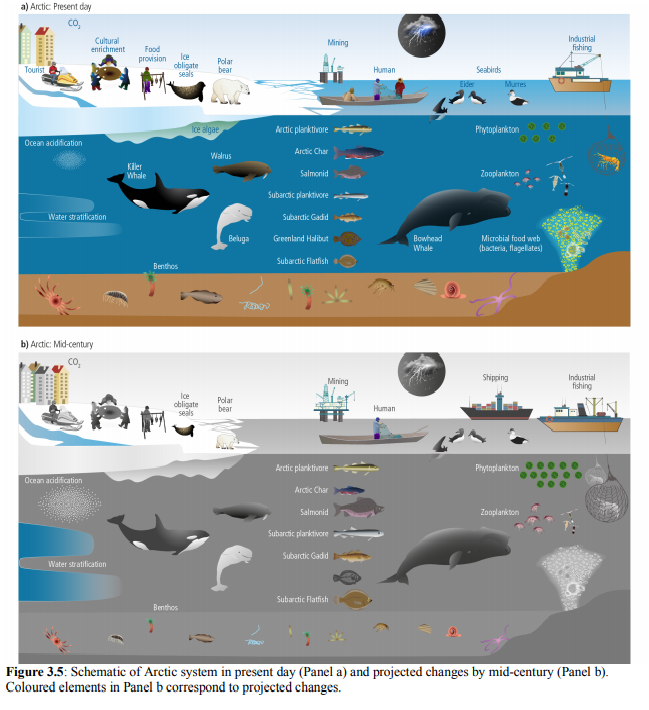
“This report proves what Inuit have been saying for decades,” said Monica Ell-Kanayuk, the president of the Inuit Circumpolar Council – Canada, the Canadian chapter of the orignanization representing Inuit in Canada, Greenland, Russia and the United States.
“Warming oceans and air mean reduced ice coverage, rising sea levels, contributing to flooding in low lying areas, and the erosion of our shorelines resulting in massive relocations of infrastructure and people,” she said in a news release on Wednesday.
“Sea level rise presents society with profound governance challenges and difficult social choices”
Sea level has increased around 15cm during the 20th century, by 3.6 mm per year between 2005–2015 and is accelerating, with the potential to affect everything from coastal cities to land use.
“The expected impacts of sea level rise on coastal ecosystems over the course of the century include habitat contraction, loss of functionality and biodiversity, and lateral and inland migration,” the report said. “Impacts will be exacerbated in cases of land reclamation and where anthropogenic barriers prevent inland migration of marshes and mangroves and limit the availability and re-location of sediment.
“Choosing and implementing responses to sea level rise presents society with profound governance challenges and difficult social choices, which are inherently political and value-laden.”
Mass loss from Arctic glaciers and the Greenland and Antarctic ice sheets continue to add to global sea level rise, says the report.
“The combined sea level rise contribution from both ice sheets for 2012-2016 was 1.2 ± 0.1 mm yr-1 , a 29% increase on the 2002-2011 contribution and a ~700% increase on the 1992-2001 period,” it said.
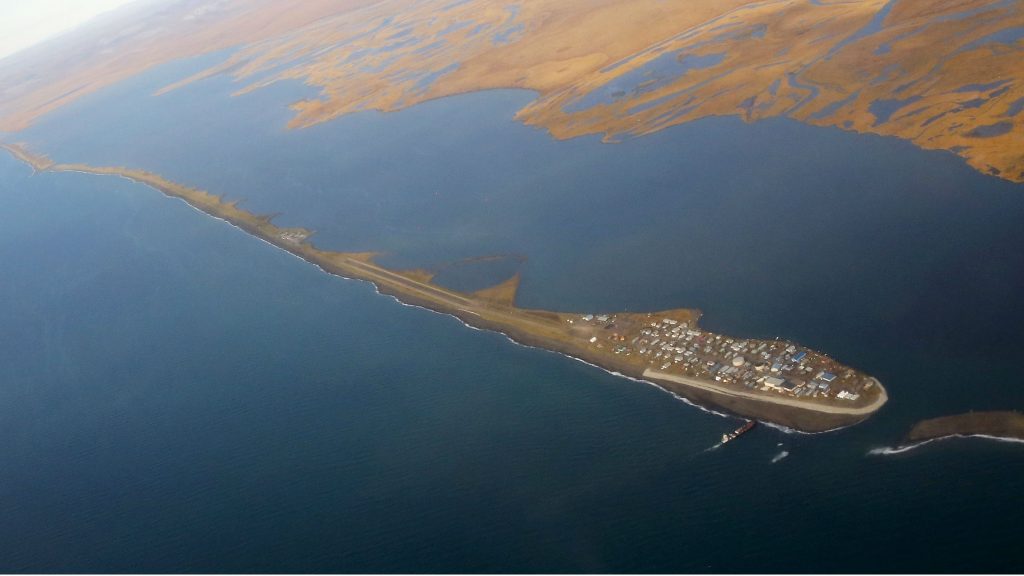
The report urged urgent action from the international community to respect targets set out in the Paris climate change agreement to keep global temperature increase to less than 2 degrees Celsius above pre-industrial levels, warning that the two degree increase would be a game changer effect everything from permafrost.
“Even if global warming is limited to well below 2°C, around 25% of the near-surface (3-4 meter depth) permafrost will thaw by 2100,” says the report. “If greenhouse gas emissions continue to increase strongly, there is a potential that around 70% nearsurface permafrost could be lost.
Ocean ecosystems would also be affected.
“Marine heatwaves have doubled in frequency since 1982 and are increasing in intensity,” the report says. “They are projected to further increase in frequency, duration, extent and intensity. Their frequency will be 20 times higher at 2°C warming, compared to pre-industrial levels. They would occur 50 times more often if emissions continue to increase strongly.”
Indigenous knowledge helped inform report
The report says the fragmented governance landscape in the Arctic complicates human response to climate change.
The capacity of governance systems in polar regions to respond to climate change has strengthened recently, but the development of these systems is not sufficiently rapid or robust to address the
challenges and risks to societies posed by projected changes,” says the report. “The governance landscape is currently not sufficiently equipped to address cascading risks and uncertainty in an integrated and precautionary way within existing legal and policy frameworks .”
“We will only be able to keep global warming to well below 2°C above pre-industrial levels if we effect unprecedented transitions in all aspects of society, including energy, land and ecosystems, urban and infrastructure as well as industry,” said Debra Roberts, Co-Chair of IPCC Working Group II, that looks at the vulnerability of social-economic and natural systems to climate change.
“The ambitious climate policies and emissions reductions required to deliver the Paris Agreement will also protect the ocean and cryosphere – and ultimately sustain all life on Earth,”
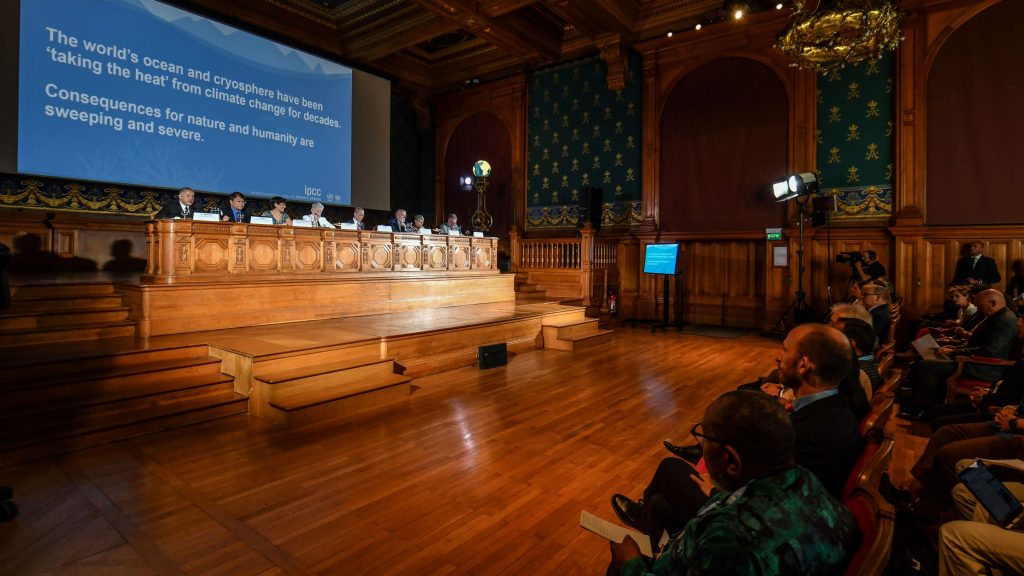
However, it says better institutional links with Arctic communities and integration of local knowledge into climate adaptation and mitigation strategies will be important not just for the North but for the global community.
“The tightly-coupled relationship of northern local communities and their environment provide an opportunity to better understand climate change and its effects, support adaptation and limit unintended consequences,” the report says. “Enabling conditions for the involvement of local communities in climate adaptation planning include investments in human capital, engagement processes for knowledge co-production, and systems of adaptive governance.”
ICC – Canada said the focus on Indigenous knowledge was an important acknowledgement from the International community.
“The Report also points to our reliance on our environment and history with our homelands as key strengths informing our understanding of adaptation as well as our management and governance structures,” said ICC Canada in a news release on Wednesday.
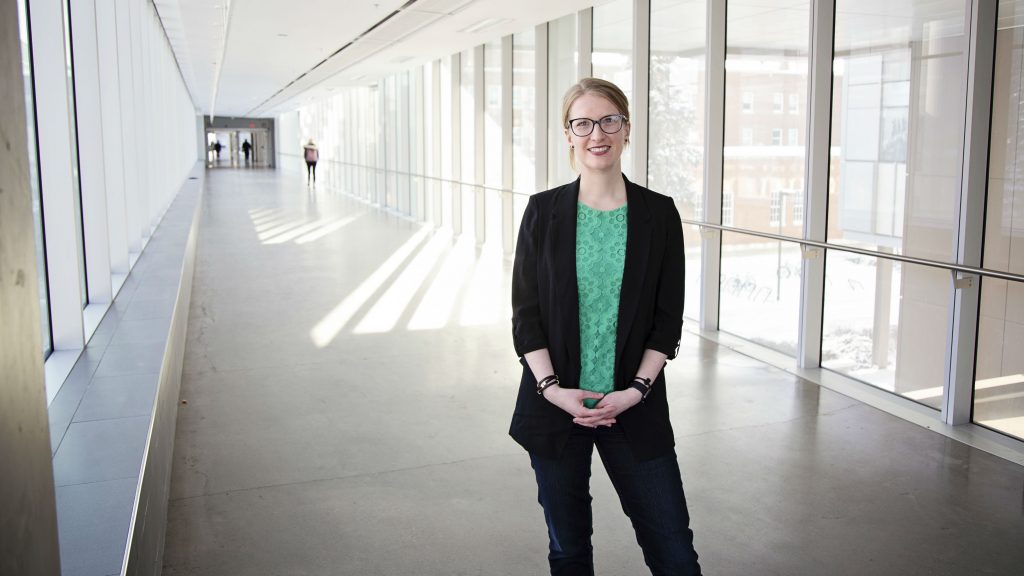
For more about climate change and the importance of linking Arctic climate change to the rest of the world, Eye on the Arctic reached Sherilee Harper, an associate professor at Canada’s University of Alberta and a contributing author to the Polar Regions chapter of the SROCC report, in Monaco on Wednesday:
Sherilee Harper, an associate professor at the School of Public Health at Canada’s University of Alberta and a contributing author to the Polar Regions chapter of the SROCC report, says the incorporation of Indigenous knowledge as a form of evidence to inform the report is one of its strengths.
“This meant that Inuit voices from Canada were actually able to be integrated into the report,” Harper told Eye on the Arctic in a phone interview from Monaco. “Indigenous knowledge has a really important role to play in these types of assessments in terms of understanding how climate change is impacting our environment but also understanding how to respond to those changes.”
Sixth assessment report due in 2022
The IPCC is a United Nations body made up of international experts from 195 states.
It was set up in 1988 by the World Meteorological Organization and the United Nations Environment Programme.
The body does not do its own research, but examines climate science published worldwide to provide policymakers with information on climate change impacts as well as adaptation and mitigation strategies.
Much of its work from its fifth assessment report was used to inform the Paris Climate Agreement.
The IPCC Special Report on the Ocean and Cryosphere in a Changing Climate (SROCC) is the third special report produced during the IPCC’s Sixth Assessment Cycle.
The IPCC’s sixth assessment report is slated for 2022.
Write to Eilís Quinn at eilis.quinn(at)cbc.ca
Related stories from around the North:
Antarctica: Could snow cannons in Antarctica help avert catastrophic sea level rise?, Eye on the Arctic
Canada: Warming Arctic shrinking Canadian glaciers at alarming rate says study, Eye on the Arctic
Denmark: Nordic PMs sign climate declaration at Iceland meeting, Eye on the Arctic
Greenland: July may surpass hottest month in recorded history says World Meteorological Organization, Eye on the Arctic
Iceland: Iceland glacier lost to climate change to get memorial ceremony this month, Eye on the Arctic
Norway: Climate change is about to divide Norway’s largest Arctic island, The Independent Barents Observer
Russia: September’s Arctic sea-ice on track for second lowest on record, Eye on the Arctic
United States: New study predicts ‘radical re-shaping’ of Arctic landscape by 2100, CBC News



